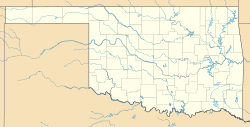Skullyville, Oklahoma
| Skullyville | |
|---|---|
| Unincorporated community | |
| Location within the state of Oklahoma | |
| Coordinates: Lua error in package.lua at line 80: module 'strict' not found. | |
| Country | United States |
| State | Oklahoma |
| County | Le Flore |
| Time zone | Central (CST) (UTC-6) |
| • Summer (DST) | CDT (UTC-5) |
Skullyville (also spelled Scullyville) is a small unincorporated rural community in Le Flore County, Oklahoma, United States. It is about one mile east of Spiro, Oklahoma and 15 miles (24 km)west of Fort Smith, Arkansas. Now essentially nothing but a cemetery remains, but it was an important community before the Civil War. Skullyville was the site of the Choctaw Agency from 1832 until 1839. It then became the capital of the Mushulatubbe District of the Choctaw Nation, a stop for the Butterfield Stage and capital of the Choctaw Nation. The town suffered serious damage during the Civil War, then was bypassed by the railroad and abandoned by businessmen who moved to the nearest railroad station. Closure of the post office in 1917 was essentially the death knell of the town. It is now considered a ghost town.
The name is derived from "iskulli" or "iskuli", the Choctaw word for money, because originally this was the place where annuity payments were collected. Author W. B. Morrison claimed that the English meaning of Skullyville was "Moneytown."[1]
History
The Choctaw Indian agency was built on this site in 1832, and a community developed around it. Until 1859, the community was officially called Choctaw Agency. Major F. W. Armstrong served as the first agent until he died in 1835. He was succeeded by his brother, William Armstrong. Reportedly, both were very well liked by the Choctaws.[2] Skullyville, then known as Oak Lodge, was the former capital of the Choctaw Nation, the capital of the Mushulatubbee District of the Choctaw Nation,[3] and a stop on the California Road. Walker's Station, a stage stand on the Butterfield Overland Mail route, was located in Skullyville.
Fort Coffee was built at Swallow Rock, about 4 miles (6.4 km) from the Choctaw Agency in 1834. The army only maintained it for four years before removing the garrison. The Methodists took over the facility and converted it to a boys' school, Fort Coffee Academy. The buildings were burned down during the Civil War and the school was never reopened.[1]
The Methodist Church established New Hope Seminary in Skullyville during the mid 1840s. This was a girls' school that attracted students from all over the Choctaw Nation. It reopened after the Civil War, and continued to operate until the building burned down in 1896.[1]
Skullyville became a political, educational and social center for the Choctaws during the 1840s. Then, the national capital moved to Doaksville in 1850. The move created more tribal political strife. It resulted in the adoption of the Skullyville Constitution at a convention in Skullyville in 1858.[1]
Tandy Walker, one of the most prominent residents, took over the former Choctaw Agency building when he became in charge of the Butterfield Stage stop in 1858. The building became both Walker's residence and the Butterfield Stage office. Walker retained it as his home until he died in 1877. According to Morrison, the old agency building still stood in the 1930s.[1] The structure is listed in the National Register of Historic Places (NR 72001074).[2]
Skullyville began to decline after the Civil War, when many of the buildings were burned. The Kansas City Southern Railway bypassed it in 1895, and the town's businessmen moved to Spiro, the closest railroad station. The post office closed in 1917, essentially signifying the death of the town. Skullyville is now a ghost town, with only a cemetery remaining.[2]
The community is part of the Fort Smith, Arkansas-Oklahoma Metropolitan Statistical Area.
Notable people
- Frank Crawford Armstrong, general in the Confederate Army, born in Skullyville
- Douglas H. Johnston, Chickasaw Nation governor
- Edmund McCurtain, Choctaw principal chief
- Green McCurtain, Choctaw principal chief
- Tandy Walker, colonel in the Confederate Army.
Further reading
- Hartshorne, G.E., MD. "Skullyville and Its People in 1889". Chronicles of Oklahoma 28:1 (Spring 1950) 85-88. (accessed August 28, 2006).
- Morrison, W.B. "The Saga of Skullyville". Chronicles of Oklahoma 16:2 (June 1938) 234-240. (accessed August 28, 2006).
References
- ↑ 1.0 1.1 1.2 1.3 1.4 Morrison, W. B. "The Saga of Skullyville." Chronicles of Oklahoma. Volume 16, Number 2.June 1938. Retrieved March 8, 2014.
- ↑ 2.0 2.1 2.2 Jon D.May, "Scullyville." Encyclopedia of Oklahoma History and Culture. Accessed March 8, 2014.
- ↑ Dennis Peterson, "Fort Coffee," Encyclopedia of Oklahoma History and Culture. Accessed September 16, 2012.

